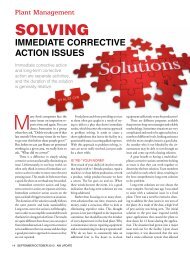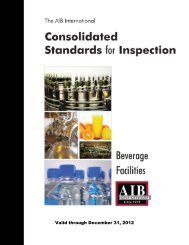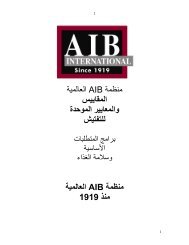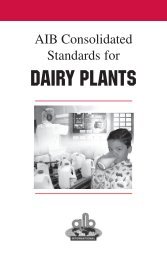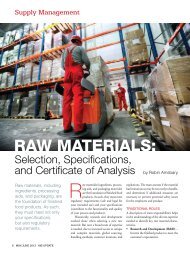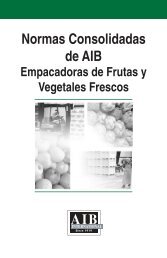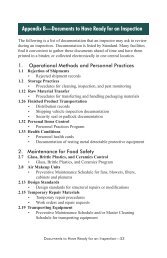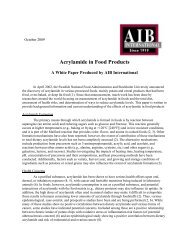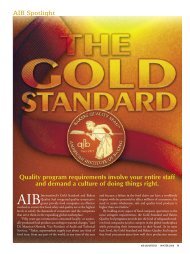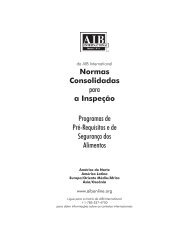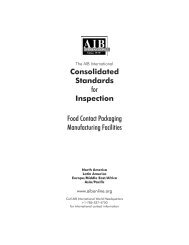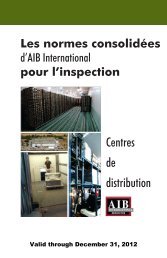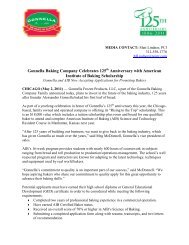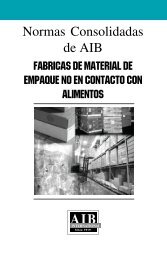Consolidated Standards for Inspection Food Distribution Centers
Consolidated Standards for Inspection Food Distribution Centers
Consolidated Standards for Inspection Food Distribution Centers
You also want an ePaper? Increase the reach of your titles
YUMPU automatically turns print PDFs into web optimized ePapers that Google loves.
5.11 Allergen Control Program<br />
The Allergen Control Program controls known allergens throughout the production process from receiving to distribution.<br />
Critical Requirements<br />
5.11.1.1 The facility has a written Allergen Control Program that addresses allergens specifi c to country regulations.<br />
5.11.1.2 Procedures address:<br />
• Identifi cation and segregation of allergens during storage and handling based on risk assessment conducted<br />
by the facility<br />
• Prevention of cross contact or contamination during processing by using measures such as:<br />
◊ Control of rework<br />
◊ Equipment and utensils management<br />
• Personnel awareness training and education<br />
• Defi ned cleaning procedures to remove any spills to prevent allergen contamination or cross contact as<br />
defi ned by the risk assessment and written Allergen Control Program<br />
5.11.1.3 The Program is updated when there are changes in <strong>Food</strong> Products.<br />
5.12 Glass, Brittle Plastics, and Ceramics Program<br />
A Program supports proactive steps to prevent contamination from glass, brittle plastics, and ceramics.<br />
Critical Requirements<br />
5.12.1.1 The facility has a written Glass, Brittle Plastics, and Ceramics Program.<br />
5.12.1.2 The written Glass, Brittle Plastics, and Ceramics Program includes the following policy statements:<br />
• All light bulbs, fi xtures, windows, mirrors, skylights, and other glass over exposed product zones are<br />
protected against glass breakage (e.g., rework, repackaging, etc.). All other glass that is not of the safety<br />
type or otherwise protected is managed as part of the Glass, Brittle Plastics, and Ceramics Program.<br />
• Glass in personal belongings is restricted to break areas or other designated controlled areas.<br />
5.12.1.3 Procedures address:<br />
• Handling breakage (including stored glass, brittle plastics, or ceramics)<br />
• A register/list of essential glass, brittle plastics, and ceramics<br />
• Scheduled inspections of essential glass, brittle plastics, and ceramics to check <strong>for</strong> accidental breakage or<br />
damage<br />
5.13 Cleaning Program<br />
A Cleaning Program with schedules and procedures <strong>for</strong> accomplishing tasks is critical <strong>for</strong> maintaining a wholesome and safe<br />
food-processing environment.<br />
Critical Requirements<br />
5.13.1.1 The facility has a written Cleaning Program.<br />
5.13.1.2 The written Cleaning Program includes the following schedules:<br />
• A Master Cleaning Schedule (MCS) <strong>for</strong> periodic cleaning assignments<br />
• A Housekeeping Schedule <strong>for</strong> daily cleaning assignments<br />
5.13.1.3 The Master Cleaning Schedule addresses all equipment, structures, and grounds that impact food products.<br />
The MCS is current and accurate, and includes the following:<br />
• Frequency of activities<br />
• Personnel responsible<br />
• Post-cleaning evaluation techniques, which could include visual inspections<br />
• Documented Corrective Actions<br />
5.13.1.4 The facility has written cleaning procedures <strong>for</strong> all equipment, structures, and grounds that impact the<br />
storage, processing, and packaging of food products.<br />
5.13.1.5 Equipment cleaning procedures address:<br />
• Chemicals<br />
• Chemical concentrations<br />
• Tools<br />
• Disassembly instructions<br />
24—<strong>Consolidated</strong> <strong>Standards</strong> <strong>for</strong> <strong>Inspection</strong>



